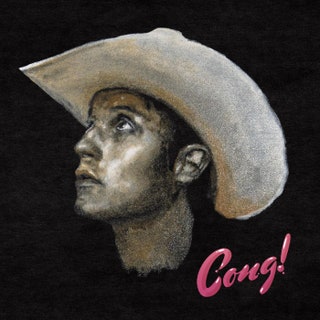Nic Oogjes’ lounge-lizard alter ego makes heady, gleefully ridiculous no wave pastiche held together by flamboyance and a predilection for showmanship.
As de facto leader of Melbourne dance-punk collective NO ZU, Nic Oogjes is known as a party starter: a singlet-and-suit-clad frontman who yaps and yowls as the sometimes 10- or 11-piece band behind him whips up frantic, ESG and Liquid Liquid-indebted grooves. Over the past decade, NO ZU and their self-described “heat beat” have developed a cult audience on the Australian touring circuit—a feat that, for Oogjes, has come with drawbacks. “NO ZU has become a big beast with (perceived) expectations associated and a lot of members to organize,” he said last year. “I really needed a more immediate, free-er and efficient outlet.”
He found it in an alter ego anagram, Cong Josie: a cokey, coquettish lounge lizard more likely to be found prowling the club after the other partygoers have gone home. On Cong!, his first album as Cong Josie, Oogjes eschews NO ZU’s hot-blooded funk influences in favor of touchpoints from the chillier end of the no wave spectrum—namely Suicide. Drawing from the sounds of downtown New York in the 1970s but littered with references to ultra-specific Australian iconography, Cong! is a heady, gleefully ridiculous piece of genre pastiche held together by Oogjes’ flamboyance and predilection for showmanship.
Oogjes wears his references so proudly, and wrings so much out of them, that Cong! risks coming across as little more than hero worship. He is a clear Alan Vega Martin Rev devotee: Most every track on Cong! is anchored by chintzy synths and hard-edged, plasticky basslines that give the whole record an insistent, strung-out atmosphere. “Leather Whip,” a louche highlight, feels like “Diamonds, Fur Coat, Champagne” with a little less sparkle—“Rhinestones, Velour, Cava,” perhaps. Like Alan Vega drooling out signifiers of nightlife luxury until they’re little more than sounds, Oogjes repeats the song’s title with an elastic, rockabilly quiver in his voice, a distended parody of sadism and machismo.
Produced by Oogjes and written with NO ZU’s Cayn Borthwick, Cong! covers a surprising amount of ground within its relatively spare palette: the sax-gilded stomp of “Flamin’ Heart” is a theatrical, villainous highlight, while “Wedding Bells” sounds like ’60s girl-group pop remade as slow, rimy EBM. A lot of the album is extremely funny, too, toying with the absurdity of Australiana, as on “Snake Oil Speeder,” a largely unintelligible track in which detached bits of animal names—“goanna,” “red-headed,” “thorny”—float to the surface like pond scum. You can practically picture Oogjes on QVC, a soused, gimlet-eyed hustler selling tonics made of echidnas and spiders to unwitting city folk.
On “Cong the Singer,” one of the record’s best tracks, Oogjes narrates one of Cong Josie’s misadventures as if he were some kind of rock god, peppering the story with painfully mundane markers of Melbourne suburbia—the EastLink freeway, Springvale Road—as if they were Sunset and Vine. Delivered in an ocker deadpan instead of his usual rockabilly moan, the monologue is a charming, edge-softening moment: It recontextualizes Cong! as not just a piece of no wave fetishism but a pulpy fantasy dreamed up from the suburban fringes—a vision wherein the gray suburban roads of Oogjes’ youth led to electrifying avant-garde nightlife, rather than linoleum-floored RSL clubs and drab strip malls.
Even if you can’t connect to this very Australian—and, in a sense, very Gen X and millennial—subtext, Oogjes is still a consummate entertainer, and even at its most parochial, Cong! is enjoyable, tightly produced EBM that never takes itself too seriously. The energy that made Oogjes such a magnetic bandleader in NO ZU is plain to see: Whether he’s delivering his words in a porny, sweat-dampened shudder or a rubbery, drunken wail reminiscent of Chris Isaak, his presence is undeniable. His tone often seems to be more important than the lyrics, which are frequently lost among his slurred croons. Sometimes, a phrase comes through (“With you, I’ll never never be blue,” he sings on “Persephone,” a touching song written for his daughter) but even when they don’t, the vibe is never lost. Cong! runs on karaoke principles: If you sing with enough feeling, do words even matter?



0 comments:
Post a Comment